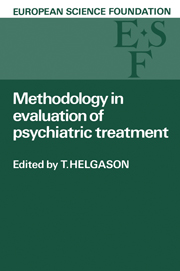 Methodology in Evaluation of Psychiatric Treatment
Methodology in Evaluation of Psychiatric Treatment Book contents
- Frontmatter
- Contents
- Participants
- Foreword
- Preface
- INTRODUCTION
- I METHODS OF CLASSIFICATION
- II EVALUATION CRITERIA
- III RATING METHODS IN EVALUATION OF TREATMENT
- IV OTHER QUANTITATIVE METHODS OFEVALUATION OF TREATMENT
- Psychophysiological Criteria
- Biological Quantitative Methods in the Evaluation of Psychiatric Treatment: SomeBiochemical Criteria
- V ETHICALAND PRACTICAL PROBLEMS
- Index
Biological Quantitative Methods in the Evaluation of Psychiatric Treatment: SomeBiochemical Criteria
from IV - OTHER QUANTITATIVE METHODS OFEVALUATION OF TREATMENT
- Frontmatter
- Contents
- Participants
- Foreword
- Preface
- INTRODUCTION
- I METHODS OF CLASSIFICATION
- II EVALUATION CRITERIA
- III RATING METHODS IN EVALUATION OF TREATMENT
- IV OTHER QUANTITATIVE METHODS OFEVALUATION OF TREATMENT
- Psychophysiological Criteria
- Biological Quantitative Methods in the Evaluation of Psychiatric Treatment: SomeBiochemical Criteria
- V ETHICALAND PRACTICAL PROBLEMS
- Index
Summary
Introduction
Different biological approaches (genetic, biochemical, neuroendocrine, neurophysiological) are used for studying psychiatric disorders. Some studies have attempted to find biological predictors ofthe response to various treatments. Although this field is a relatively new one, the results being sometimes controversial, its impact on research and treatment is of great importance.
We shall attempt to review some of the promising areas of research into biochemical predictors in relation to treatment response mainly in affective illnesses, as little data is available for schizophrenia and other psychiatric disorders. Table 1 shows the main biochemical predictors of treatment response in affective disorders.
Response to tricyclic antidepressants
Methoxy-4-hydroxyphenyl glycol (MHPG) studies
MHPG, the major metabolite of central norepinephrine (NE), may provide a useful index of brain NE turnover when measured in 24-hour urine tests (Schildkraut et aI1978). Maas et al (1972) reported low (< 900mg MHPG/g creatinine) pre-treatment urinary MHPG concentration in depressed patients who responded to imipramine and desipramine and high (>1350mg MHPGIg creatinine) MHPGconcentration in imipramine and desipramine non-responders. In the same study, Maas et at also reported that other NE metabolites (vanillyl mandelic acid, normetanephrine and metanephrine) did not predict response to imipramine in the same patients.
Schildkraut (1973) found high urinary MHPG excretion in amitriptyline- responders and low pre-treatment urinary MHPG levels in amitriptyline non-responders.
Beckman & Goodwin (1975) reported the mean urinary excretion of MHPG to be high (2,170 IJg/24h) in the imipramine responders. A low urinary MHPG excretion rate was also found by Hollister et al (1980) in patients responding to nortriptyline.
In a recent study, Cobbin et al (1979) applied these observations to clinical practice. The authors found a significantly better drug response in the group of patients when treatment was chosen by biochemical criteria (pre-treatment MHPG urinary level) than in those where treatment was decided on the basis of clinical criteria.
An interesting finding is the prediction of good response to imipramine and desipramine by the D-amphetamine test. When given D-amphetamine orally for two days, some depressed patients show a transitory enhancement of mood. In the study of Fawcett & Siomopoulos (1971), D-amphetamine responders showed a good response to imipramine and desimipramine and had low pre-treatment urinary MHPG levels.
- Type
- Chapter
- Information
- Methodology in Evaluation of Psychiatric TreatmentProceedings of a Workshop Held in Vienna 10–13 June 1981, pp. 231 - 248Publisher: Cambridge University PressPrint publication year: 1983


